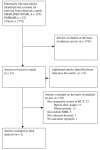Evidence for handheld electronic medical records in improving care: a systematic review
- PMID: 16787539
- PMCID: PMC1538581
- DOI: 10.1186/1472-6947-6-26
Evidence for handheld electronic medical records in improving care: a systematic review
Abstract
Background: Handheld electronic medical records are expected to improve physician performance and patient care. To confirm this, we performed a systematic review of the evidence assessing the effects of handheld electronic medical records on clinical care.
Methods: To conduct the systematic review, we searched MEDLINE, EMBASE, CINAHL, and the Cochrane library from 1966 through September 2005. We included randomized controlled trials that evaluated effects on practitioner performance or patient outcomes of handheld electronic medical records compared to either paper medical records or desktop electronic medical records. Two reviewers independently reviewed citations, assessed full text articles and abstracted data from the studies.
Results: Two studies met our inclusion criteria. No other randomized controlled studies or non-randomized controlled trials were found that met our inclusion criteria. Both studies were methodologically strong. The studies examined changes in documentation in orthopedic patients with handheld electronic medical records compared to paper charts, and both found an increase in documentation. Other effects noted with handheld electronic medical records were an increase in time to document and an increase in wrong or redundant diagnoses.
Conclusion: Handheld electronic medical records may improve documentation, but as yet, the number of studies is small and the data is restricted to one group of patients and a small group of practitioners. Further study is required to determine the benefits with handheld electronic medical records especially in assessing clinical outcomes.
Figures
Similar articles
-
Comparison of handheld computer-assisted and conventional paper chart documentation of medical records. A randomized, controlled trial.J Bone Joint Surg Am. 2004 Mar;86(3):553-60. doi: 10.2106/00004623-200403000-00014. J Bone Joint Surg Am. 2004. PMID: 14996882 Clinical Trial.
-
The use of personal digital assistants in clinical decision making by health care professionals: a systematic review.Health Informatics J. 2013 Mar;19(1):16-28. doi: 10.1177/1460458212446761. Health Informatics J. 2013. PMID: 23486823 Review.
-
Evidence of effectiveness of health care professionals using handheld computers: a scoping review of systematic reviews.J Med Internet Res. 2013 Oct 28;15(10):e212. doi: 10.2196/jmir.2530. J Med Internet Res. 2013. PMID: 24165786 Free PMC article. Review.
-
The use of handheld technology in nursing research and practice.Orthop Nurs. 2007 Jul-Aug;26(4):251-5. doi: 10.1097/01.NOR.0000284655.62377.d9. Orthop Nurs. 2007. PMID: 17882103
-
The educational effects of portfolios on undergraduate student learning: a Best Evidence Medical Education (BEME) systematic review. BEME Guide No. 11.Med Teach. 2009 Apr;31(4):282-98. doi: 10.1080/01421590902889897. Med Teach. 2009. PMID: 19404891 Review.
Cited by
-
Exploring Usability Issues of a Smartphone-Based Physician-to-Physician Teleconsultation App in an Orthopedic Clinic: Mixed Methods Study.JMIR Hum Factors. 2021 Dec 20;8(4):e31130. doi: 10.2196/31130. JMIR Hum Factors. 2021. PMID: 34931991 Free PMC article.
-
Collecting core data in physician-staffed pre-hospital helicopter emergency medical services using a consensus-based template: international multicentre feasibility study in Finland and Norway.BMC Health Serv Res. 2019 Mar 8;19(1):151. doi: 10.1186/s12913-019-3976-6. BMC Health Serv Res. 2019. PMID: 30849977 Free PMC article.
-
The impact of routine data quality assessments on electronic medical record data quality in Kenya.PLoS One. 2018 Apr 18;13(4):e0195362. doi: 10.1371/journal.pone.0195362. eCollection 2018. PLoS One. 2018. PMID: 29668691 Free PMC article.
-
A Mobile App (BEDSide Mobility) to Support Nurses' Tasks at the Patient's Bedside: Usability Study.JMIR Mhealth Uhealth. 2018 Mar 21;6(3):e57. doi: 10.2196/mhealth.9079. JMIR Mhealth Uhealth. 2018. PMID: 29563074 Free PMC article.
-
Assessing the Usability of Six Data Entry Mobile Interfaces for Caregivers: A Randomized Trial.JMIR Hum Factors. 2015 Dec 15;2(2):e15. doi: 10.2196/humanfactors.4093. JMIR Hum Factors. 2015. PMID: 27025648 Free PMC article.
References
-
- Kohn LT, Corrigan JM, Donaldson MS. To err is human: building a safer health system. Washington, National Academy Press; 2000. http://www.nap.edu/catalog/9728.html - PubMed
-
- Brennan TA, Leape LL, Laird NM, Hebert L, Localio AR, Lawthers AG, Newhouse JP, Weiler PC, Hiatt HH. Incidence of adverse events and negligence in hospitalized patients. Results of the Harvard Medical Practice Study I. N Engl J Med. 1991;324:370–376. - PubMed
-
- Wilson RM, Runciman WB, Gibberd RW, Harrison BT, Newby L, Hamilton JD. The Quality in Australian Health Care Study. Med J Aust. 1995;163:458–471. - PubMed
Publication types
MeSH terms
LinkOut - more resources
Full Text Sources
Miscellaneous


